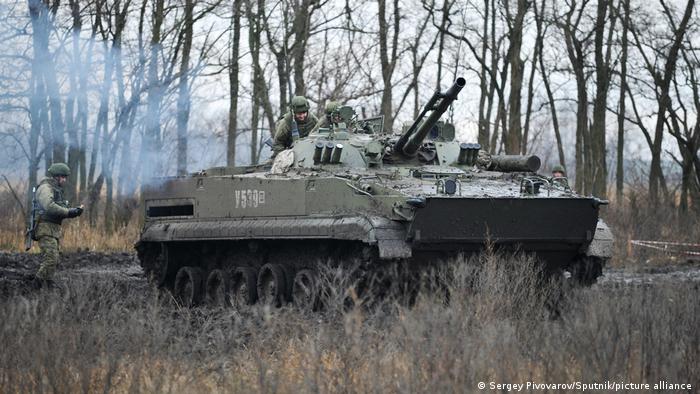
The German chancellor and the head of NATO on Tuesday urged Russia to de-escalate amid fears that Moscow may be planning an invasion of Ukraine.
NATO Secretary General Jens Stoltenberg and Chancellor Olaf Scholz spoke after the pair met in Berlin to discuss the perceived threat of a conflict.
What did the leaders say?
Scholz said Germany and NATO expected Russia to de-escalate the situation on the border with Ukraine by, for example, reducing the number of troops there.
He said both were agreed that Russia would face severe political and economic consequences if there was an invasion.
"We are finding in these days again how important it is that we together make our contribution to ensure stability, peace, and security in Europe," said Scholz. "It cannot be taken for granted that this is always the case."
Stoltenberg said NATO allies were keen to engage with Russia on any concerns it may have, urging Russia to talk.
"The risk of a conflict is real," Stoltenberg said. "NATO allies call on Russia to deescalate. We encourage Russia to reverse its decision to cut diplomatic ties with NATO."
Moscow has stationed some 100,000 troops near the border with Ukraine, something the West has interpreted as preparation for a war to stop Ukraine from ever joining NATO. The alliance agreed at a summit in 2008 that Ukraine would one day become a member.
Stoltenberg said he had invited Russia and NATO allies to new talks "in the near future." He said the aim was to "address our concerns but also listen to Russia's concerns, and to try to find a way forward to prevent any military attack against Ukraine."
Russia denies that it is planning an invasion.
Germany wants talks on 'security for all'
The Western military alliance has been seeking dialogue with Moscow, although talks appear to have stalled.
German Foreign Minister Annalena Baerbock, while visiting Moscow on Tuesday— said Berlin was prepared for a serious dialogue with Moscow about "security for all in Europe." On Monday, Baerbock visited the Ukrainian capital, Kyiv, where she warned that Russia faced a firm response if it resorted to military escalation.
In light of the troop build-up, NATO has intensified the strategy it has employed since Russia annexed the Crimea peninsula from Ukraine in 2014.
The alliance has conducted more defensive military planning. It has also sought to modernize deterrents and support Ukraine with cyber warfare teams. However, NATO is under no treaty obligation to defend Ukraine, which is not a member.
Since 2014, NATO has prioritized reinforcing the Baltics and deployed four multinational battalion-size battlegroups — led by Canada, Germany, Britain and the United States — in Latvia, Lithuania, Estonia and Poland.
It's expected that if Russia invaded Ukraine, NATO would be likely to raise its alert level and reinforce its troop presence in the Baltics and Poland. It's also thought the alliance might station more troops in southeastern Europe.
The European Union might face some of the toughest challenges if Russia does invade. These might include imposing sanctions on Russia, managing a cut in supplies of gas to Europe, and accommodating refugees fleeing any war.